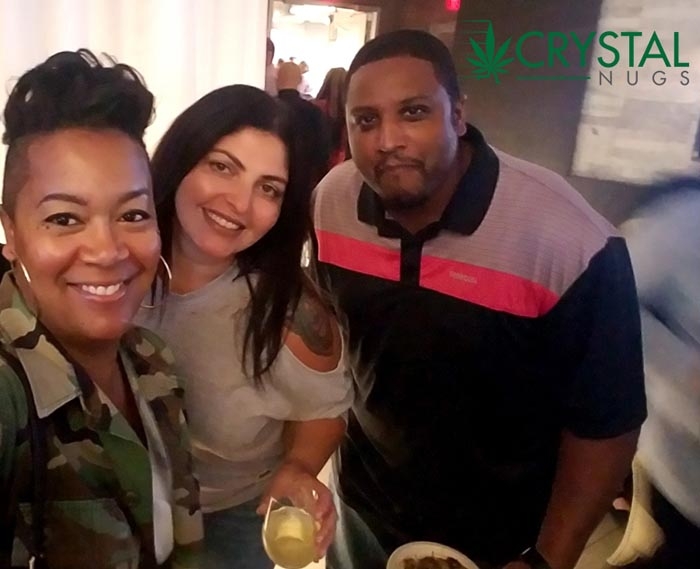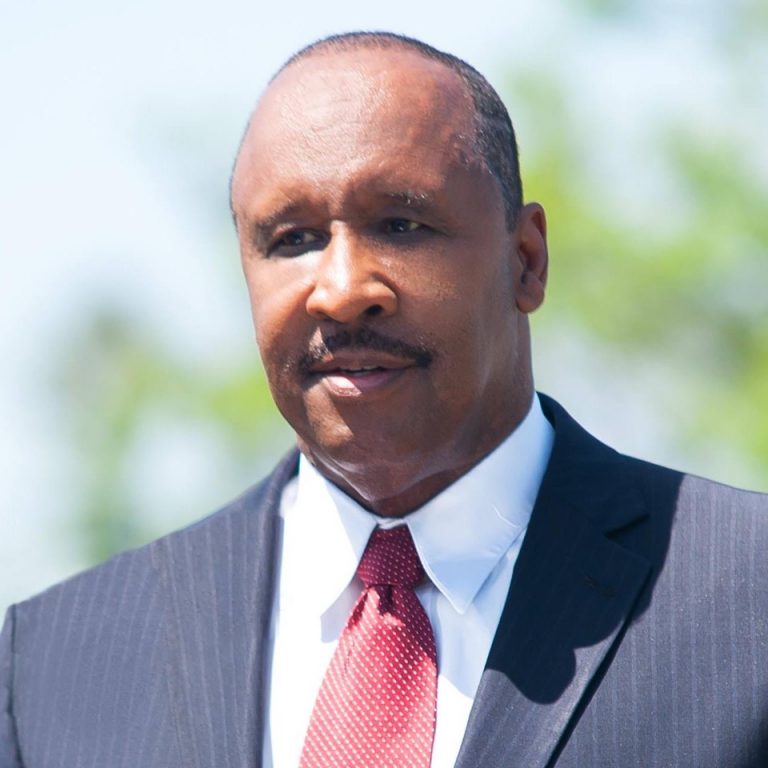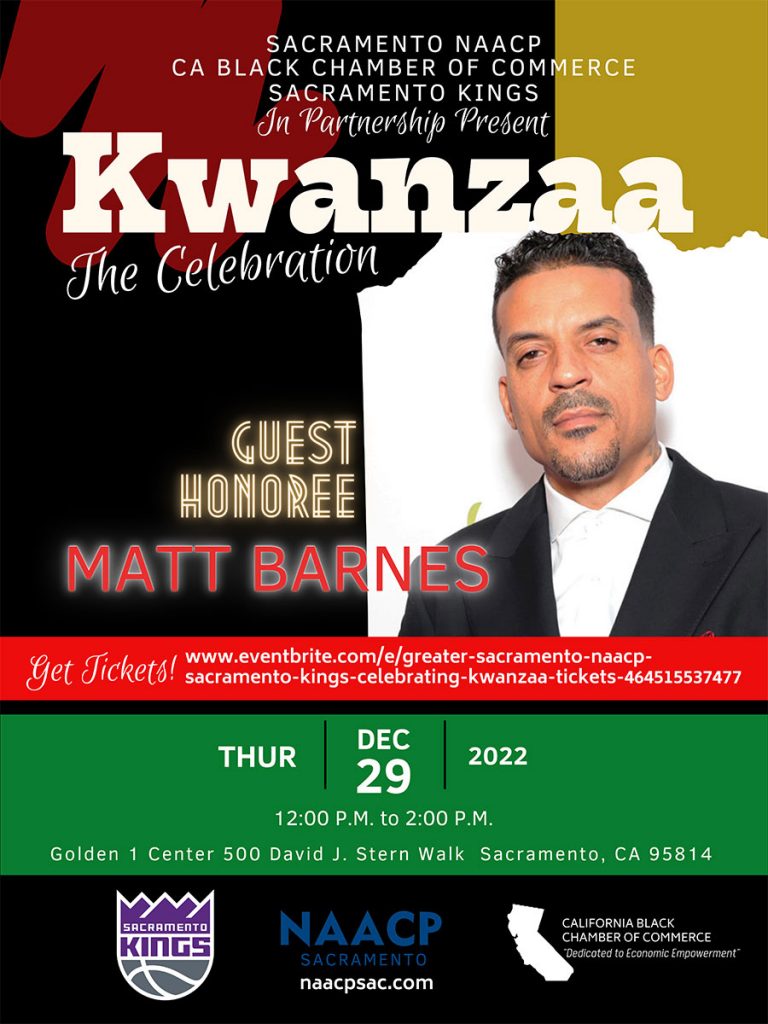
By Pleshette Robertson, Chief Editor
The first Black-owned Cannabis delivery company, Crystal Nugs, in Sacramento has joined the ranks of white dominated industry of dispensaries across America. NBC reports that Whites make up more than 80 percent of marijuana business owners, compared with only 4.3 percent of Blacks. But more people of color are entering the industry.
THE HUB sat down with one of 3 owners, Maisha Bahati, of Crystal Nugs to learn more about their break in the industry and what opportunities and challenges are ahead in the booming cannabis industry. Maisha is a wife, and mother of 3, and a fashion designer who has participated in Sacramento’s Fashion Week and other charity events.
###
THE HUB: How long have you been designing clothes?
Bahati: I taught myself to sew 15 years ago for a hobby. I created my business MaishaBahati and started selling my clothing 10 years ago.
THE HUB: As you and your 2 partners came to start Crystal Nugs, tell us more about the roles each of you all had in developing the company as well as your roles in moving forward?
Bahati: The good thing about us as business partners is that we all bring our own talents to the table. Melina Brown has been an entrepreneur for the last 20 years. She owned her own clothing store back in the early 2000’s and currently owns a tattoo shop, Stylz Tattoos and Piercing. She brings 20 years of sales, marketing and retail expertise. Bryan Brown the son of NBA legend Fred Brown has also been an entrepreneur for 10+ years in the professional sports industry. Bryan is a really likable guy who connects with people easily. He brings his savvy business knowledge, marketing and high end business connections. So together we are all bringing a new exciting energy to the cannabis industry here in Sacramento.
THE HUB: Can you share the pros and cons of you and your partners applying for the licensing process at the City of Sacramento?
Bahati: The pros of the application process for us was just making it to the next step. The cons were probably the time frame and meeting the state and city application cutoffs. The application process is intense. Cannabis is still very new to California, so the state regulations want every “T” crossed and every “I” dotted or you risk your application being denied and now you have to get back in line behind hundreds of pending applications. The state had a cutoff for temporary licenses on 12/31/18, part of the application was location. Our building had to be built out from the inside, we faced many obstacles with construction deadlines. Our application was denied on 12/5/2018. That was pretty stressful as we faced not making the 12/31 cutoff, therefore putting us at risk to not being able to open until September or October 2019 since the annual application process can take up to 8 months to be completed by the state. Luckily after many phones calls and emails we were able to reapply and submit our building completion documents in time before the cutoff. We started the process of finding a location right after prop 64 passed in Nov 2016. We have probably invested around $65k – $75k so far.
THE HUB: How long were you in the search for your building that you are currently leasing?
Mahati: Finding a location that was properly zoned was the hardest part for us. It took us a year to find a location. We were looking literally everyday. We probably met with property agents several times a week. The property value related to cannabis is extremely high. We found one property that wanted $100k deposit and $5k month. It was really difficult. We thought about giving up many times during that process. You can’t get loans, due to cannabis being federally illegal still so we had to work within our budget. It was a challenge. We were open to selling our home and rental home just to finance a location. Luckily we secured a lease in time. Our goal is to purchase our own property within the next 3 years.
THE HUB: Tell us about some of the products that potential customers will be able to order online from crystalnugs.com?
Bahati: Crystal Nugs will have an impressive selection of cannabis products consisting of edibles, flower, prerolls, tincture creams, cbd bath bombs, concentrates, vape cartridges, cbd oils, cbd edibles, cbd flower and prerolls, accessories. Crystal Nugs will also exclusively carry 2 black owned cannabis brands of flower and prerolls.
THE HUB: How do you plan to market Crystal Nugs?
Bahati: Marketing can be somewhat of a challenge. California is only a little over a year into the legal sales of cannabis and because it’s still federally illegal, many avenues of marketing have to be approached with caution. We plan to utilize every possible opportunity for marketing that include: socal media, t.v., magazines, billboards, etc.
THE HUB: As this is a cash only transaction business, what are some of the security precautions that you plan to have in place?
Bahati: Security is an important concern for cannabis. The state regulations requires various security measures that have to be implemented before your license can be approved. It varies from safes, 24 hour monitoring, armed guards, lock boxes and tracking systems, etc.
THE HUB: As you plan to grow your business, how many employees do you foresee Crystal Nugs having in 2-5 years?
Bahati: We want to grow Crystal Nugs as big as we can, adding a dispensary hopefully in the next 2 years. We have a goal for customers to receive their delivery in under 30 minutes. Therefore, the more employees we have the more customers we serve and the more money we all make. If we could have 50-100 employees in the next 2-5 years that would be ideal.
THE HUB: Being a Black woman in the cannabis industry, what is the best advice or recommendations you can offer other Black women who are looking to get in but may be reluctant due to the many regulations and huge fees involved?
Bahati: I’m very proud to be a Black women in an industry that is currently dominated by white males. It makes me work harder to make Crystal Nugs the #1 cannabis delivery in Sacramento. Yes the fees and application process can be extremely intimidating, however there are equity programs that exist to assist with starting cost, etc. I encourage black women to look into those programs and educate themselves on the laws of cannabis. This is a fast moving industry with many waiting in line for an opportunity to enter a billion dollar industry. So you have to be on it, do your homework and stay in tune with the regulations. It’s hard but it is possible for us to increase the percentage of black business ownership in cannabis.
THE HUB: What is your overall feeling about how the industry is now legalized in some states where as we saw the 1980s’ war on drugs, a governmental drug policy campaign that has more than played a role in imprisoning Black people over selling and using marijuana, yet now there is an open pathway for Black folks to become investors in the industry or opening up a business in the industry?
Bahati: Minorities were disproportionately targeted during the wars on drugs. Many went to prison and are still serving time for cannabis related crimes which currently makes them ineligible for ownership due to felonies…couple that with the struggles we face in our communities, lack of money, opportunities, knowledge of ownership in any business. However I’m starting to see cities considering throwing out cannabis convictions and developing equity programs to assist minorities with the tools to get in the industry. So I definitely see more minorities and women taking advantage of opportunities to get their foot in the door. I’m encouraged and excited.
According to the Sacramento Business Journal article, it was Malaki Seku Amen, founder of the political advocacy organization California Urban Partnership who was the lead consultant, negotiator and combatant in the effort to see the idea for the cannabis equity program become a reality–City of Sacramento Cannabis Opportunity Reinvestment & Equity (CORE) Program.
THE HUB: Maisha can you share with us your transition, if you will, in your current ownership status of a delivery company in the cannabis industry as you started your journey in this venture in 2016.
Bahati: I’ve always been a believer in visualizing what you want and claiming it for yourself. Success was something I’ve always strived for. My passion has always been some element of fashion. I love designing and creating. I worked hard to build a name for myself as a designer and gain the respect from others as a business woman in my community. My fashion line MaishaBahati expanded my social network to include other entrepreneurs. When I met my husband he was an established businessman and his support and knowledge has been huge in getting me to this point in my career. I knew nothing about cannabis prior to starting Crystal Nugs. I was hungry and ready for a huge business opportunity. As I started the rigorous application process and started attending meetings on laws and regulations I noticed there may have been a couple of black people and a handful of women. I wasn’t intimidated, I was proud to be there. Sometimes we as minorities and women have to seize our own opportunities. There is room here for us. There are many that advocate and support black and women ownership as the cannabis industry. I’m claiming success for Crystal Nugs to help create opportunities for others wanting to become a part of this industry.
###
To learn more about first black-owned cannabis delivery company in Sacramento, go to: www.crystalnugs.com
According to US News article, nearly 25 percent of the U.S. population lives in a state or jurisdiction that permits the recreational use of marijuana (allowing citizens 21 and older to use marijuana beyond medical purposes). But each state differs in its guidelines of where and when people can use the drug, in addition to how much marijuana people can grow. Here are the states where recreational marijuana is legal: Alaska, California, Colorado, Maine, Massachusetts, Michigan, Nevada, Oregon, Vermont, and Washington.






